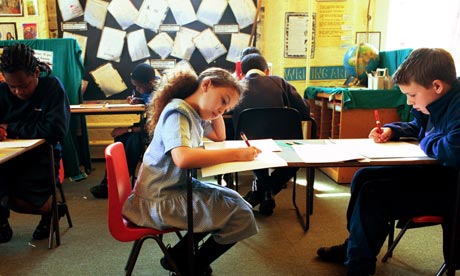
Fairycakes have been replaced by cupcakes, while someone going to a black-tie event will be sporting a tuxedo rather than a dinner jacket – at least according to the current generation of British children.
A new analysis of children's writing by Oxford University Press has revealed the extent to which American English has colonised Britain.
The study found US words and phrases such as flashlight, garbage truck, sidewalk and sneakers in children's writing, while "snuck" was frequently the past tense of sneak. Smart is regularly used to mean clever, and "cranky" for irritable.
The analysis, of 74,000 story entries in a BBC Radio 2 competition, also reveals the impact of technology. The research finds that of nearly 300 instances of the word "blackberry", almost half referred to phones. Technology was also an integral part of plots in the stories, with characters "Googling" for answers rather than looking in books and using apps rather than rabbit holes or magical wardrobes to enter fantasy worlds.
The sample is skewed towards girls – who contributed nearly two-thirds of entries. A majority of the entrants were older children, aged 10 to 13, and 88% were from England.
The OUP analysis also includes a focus on regional differences and contrasts between the sexes. Children in Glasgow make more frequent use of the word "wee" compared with other regions, while "sheep", "dragon" and "pie" are popular in south-west Wales.
The highest proportion of stories using the word "boat" come from the Highlands & Islands, while Liverpool children are among the least likely to use it, despite their city's maritime heritage.
This is the first time researchers have compiled a database of children's writing. The 31m-word collection will be compared with samples in future years to track the evolution of children's written language.
Jane Bradbury, a lexicographer at the Oxford University Press and an English teacher at a Birmingham school, said: "Although it is self-selecting it still represents a really broad range of ages and areas of the UK, and next year the aim is to make it more representative. We will work hard to get into some of the school areas that we haven't got into this time, some of the inner-city areas, and some of the rural areas."
The database – which dictionary compilers refer to as a "corpus" – reveals the influence of popular children's literature. The impact of Harry Potter and Twilight can be seen in the frequency of the word "vampire" and names of characters – "Bella" and "Harry" are common. But Roald Dahl remains a favourite two decades after his final children's book was published.
A comparison of boys' and girls' language finds that boys are more likely to use the words "sniper" and "penalty" while girls are more likely to use "fairies" and "pony". Their styles of writing are also different.
Bradbury said: "Boys are using nouns more precisely and creatively, which fits in with the James Bond, and Anthony Horowitz genre. You don't just have a phone – you describe exactly what make of phone it is and what memory it has got.
"You describe a motorbike in terms of the size of its engine and the year it was made, whereas girls might just say an amazing motorbike. They'll use those adjectives creatively."
Boys' stories tended to focus on characters solving problems using their skills, Bradbury added.
"Girls tend to go for a story arc that is more about personal development."
Fears of the rise of text-speak seem unfounded. Children only used SMS shorthand when actually referring to text messages in their stories. But archaic spellings have made a comeback – with children using "faery" and "daemon", perhaps a sign of Philip Pullman's influence.
The researchers also looked at spelling errors; finding that everyday words such as "minute" are more prone to mistakes compared with words children feel the need to look up, such as "pterodactyl".
Difficult words such as "palomino" and "archaeologist" are almost always spelled correctly, the OUP finds.
The use of word processors may be responsible for one category of error – "does" was spelled "dose" by a number of children, while "cloths" was often used instead of "clothes" and "nether" for "neither". Bradbury said: "One very obvious reason is because a spell-checker wouldn't pick it up as a mistake".

